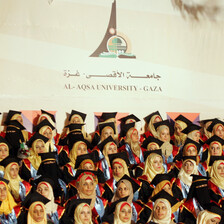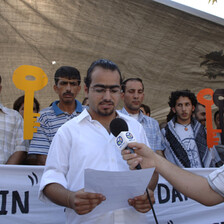The Electronic Intifada Gaza Strip 26 February 2016

Relatives of Palestinians slain by the Israeli military protest in Gaza City to demand delivery of assistance from the Palestinian Authority, 12 January.
APA imagesHanadi al-Qayid looked tired.
The 45-year-old lost two of her children when fighter jets shelled her home in the central Gaza Strip city of Deir al-Balah during Israel’s assault in the summer of 2014.
Now she attends a regular sit-in demonstration outside a branch of the Palestinian Authority office responsible for the welfare of the families of the dead and wounded. Relatives of the martyrs, are they are known, gather weekly in Gaza City to protest the decision to suspend the payment of allowances to families of the those slain by Israel in 2014.
“Officials tend to say that it is a great honor for them to serve the families of martyrs. But we have become beggars due to these offensive practices,” al-Qayid told The Electronic Intifada.
Walaa, 15, and Ahmad, 12, were not the first of al-Qayid’s children to lose their lives to the Israeli military. In 2003, their oldest brother, Mahmoud, was shot and killed by the army and as if that wasn’t enough, her husband, Said, suffered a heart attack five months ago and had to undergo urgent surgery to save his life, surgery the family needed to borrow money to pay for.
“I’ve found myself alone in consecutive ordeals,” she said, another reason her anger at the PA is so acute. “I am really upset. I have no option but to take to the streets to demand that the PA pay our allowances so we can meet the basic needs for our surviving family.”
Al-Qayid remains optimistic that the sit-in will eventually bear fruit. But she has been protesting for a year and a half and still there has been no change of heart by the West Bank-controlled PA. Indeed, the 2016 budget was passed without any resolution to the issue.
Political divisions
The problem is a consequence of the division between Fatah and Hamas, the West Bank and Gaza. It is established in Palestinian Liberation Organization law that families of those slain and injured during the struggle for the Palestinian cause should receive regular financial assistance regardless of political leanings. Yet Palestinians in Gaza, which has been run by Hamas since 2007, often face difficulties in claiming their allowances.
After each of the three wars waged on Gaza since — in winter 2008-2009, November 2012 and summer 2014 — the PA objected to paying allowances to families of the slain. It took three years for the relatives of those killed in 2012 to obtain their rights, when Mahmoud Abbas, the PA leader, finally relented and issued an order in May 2015 to pay them their dues.
The PA’s position proved to be the same after the 2014 war, and Alaa al-Birawi, spokesman for the Committee of the Families of the Martyred and Injured, set up to secure allowances for relatives of the slain, said the families of 2,360 individuals were now appealing to officials in both the Palestinian Authority and the Palestine Liberation Organization for a swift resolution.
“For a year and a half we have listened to outrageous pretexts from all sides whenever we ask for our rights. Some blame us for causing the war, and how dare to ask for compensation?” al-Birawi told The Electronic Intifada.
“It is lamentable that the PA continues to torment and mistreat such families on behalf of Israel,” he said. The authority, he said, uses Palestinian divisions to dodge its responsibilities.
“The PA cannot blame financial difficulties only when it comes to Gaza’s martyrs. It pays what equals to $500 for every martyr that has fallen in the West Bank during the current uprising,” al-Birawi said. “That is totally unjustified. We all know that the PA has huge sums that can help the thousands in Gaza who have lost their breadwinners.”
But Mohammed Nahal, the head of the Palestine Liberation Organization branch in Gaza that tackles issues related to the families of martyrs, refused to blame only the Palestinian Authority.
“We blame Hamas for not letting the PA fully reestablish its presence in the Gaza Strip so that all outstanding issues can be settled more easily, including the problem of those families,” he said.
His office had lobbied Rami Hamdallah, the appointed PA prime minister, to allocate funds, but to no avail, he said.
“The issue is highly problematic. We hoped that issue could be tackled before the start of the current year. We demanded that the government increase the funds allocated to the [martyrs’ families] foundation so that we could absorb the huge numbers of families who lost relatives during the 2014 assault. But we were not able to do anything,” he added.
Political blackmail
For now, said al-Birawi, the most pressing cases had to be dealt with first.
“Our absolute priority right now is to settle the issue of 32 families who lost both parents and whose homes were completely destroyed during the war. They are the most vulnerable,” he said.
Nearly 150 families lost three or more members in a single Israeli strike during the summer 2014 onslaught, totaling nearly 750 fatalities, according to a United Nations monitoring group.
The families’ plight goes beyond a monthly allowance, al-Birawi added. Absent PA designation as relatives of martyrs to the cause, they are deprived of free health insurance and their children will not get a free education at a Palestinian university.
Samira al-Tawil’s husband, Khaled, was also killed in the Israeli aggression of 2014. With eight children, four of them still in school, her family is now in deep financial trouble.
“I do not have any source of income to bring up my children. We have been blackmailed by the political split,” she told The Electronic Intifada.
She added that she even had to borrow money to take a taxi to participate in the protests arranged by the Martyrs’ Families committee. These demonstrations are wearying in themselves. Protesters spend nights sleeping outdoors to highlight their predicament and underscore the possible consequences of not receiving their allowances.
Awad Nawasra, 56, takes part in most of the sit-ins. He lost four members of his family in the 2014 war.
“Believe me, if I were not in acute need for the money, you would not see me participating here. But we are desperately in need,” Nawasra, who is unemployed, told The Electronic Intifada.
And it is not only relatives of the slain who are being cut off. Families of those injured and maimed who are no longer able to work and earn money have also found the PA reluctant to fulfill its obligations to them.
Muhammad Khali, 33, was severely injured in both legs during the last Israeli offensive, and doctors advised him not to do any kind of arduous physical exercise or work.
“I really wanted to lead a normal life, to make money to educate my little children,” he said. “But I am totally helpless. I can’t help my own children.”
The former construction worker wishes he could participate in the sit-in protests, but must be content with following the news from home.
All he has left is an innate faith in humanity.
“I hope that all of this is going to work out in the end,” he said. “I hope the officials’ consciences will prevail.”
Isra Saleh el-Namey is a journalist from Gaza.





